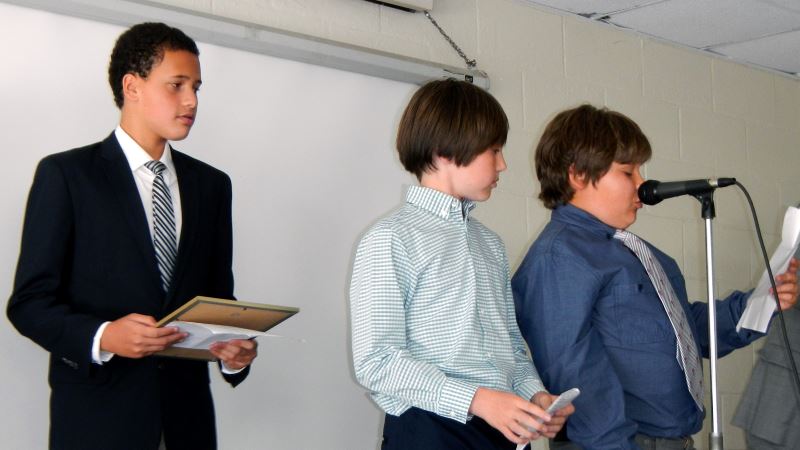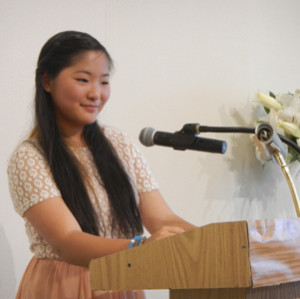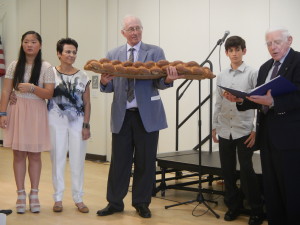Guidelines
 Sholem stresses its commitment to the concept of a secular bar/bas mitsve observance as a community celebration culminating in ceremonies and celebrations which reflect Sholem’s traditions and commitment to full participation by all members, regardless of financial status.
Sholem stresses its commitment to the concept of a secular bar/bas mitsve observance as a community celebration culminating in ceremonies and celebrations which reflect Sholem’s traditions and commitment to full participation by all members, regardless of financial status.
Sholem recognizes that the bar/bas mitsve process is a challenge and rite of passage for the participating families as well as the celebrants. We believe that a Sholem bar/bas mitsve ceremony and celebration is a unique and meaningful event, reflecting each celebrant’s Sholem School experience. There are many different alternatives available in the American Jewish community for families seeking to have their child become bar or bas mitsve; Sholem requires that each family choosing to participate in the process be aware of the traditions and principles underlying our community’s concepts, and to be sensitive to, respectful of, and commit to those traditions, principles and concepts.
The planning of the community events is a parent-directed process and the most successful and satisfying outcomes will occur when the parents meet frequently to share ideas and resources. In addition, providing practical assistance at one another’s events helps to keep the costs of these events within the range of all Sholem families.
Finally, during a process that may sometimes be difficult and stressful, parents are expected to model the community’s ideals of sharing and mutual respect which have been integral points of their children’s Sholem education.
Gift Giving
Some community members who attend bar/bas mitsve ceremonies bring gifts for the celebrants; others do not. Community members should not feel required to bring a gift, or be reluctant to attend because of concern over whether to bring a gift or what would be appropriate. Gifts are simply not required or traditional in Sholem.
However, celebrants are encouraged to designate a worthy cause or charity so that Sholem members who wish to may make a donation in the name of the celebrant(s) to the designated cause(s) or charity(s). The celebrants may choose to select one or more causes(s) or charity(s) jointly. Participating families are encouraged to include this information in the invitations which are sent to Sholem members.
Non-material Gifts
Adapting the Eastern European tradition of presenting the celebrant with a khumeshl (a “little five,” i.e., Pentateuch, the Five Books of Moses, Torah), during the ceremony, family members and friends are asked to present five “gifts” — preferably, non-material and brief — reflecting their hopes and aspirations for the young person.
Organization
In keeping with the progressive tradition of our Community, Sholem bar/bas mitsve ceremonies and community celebrations are held on a cooperative basis. There are no individual ceremonies unless there is only one participating celebrant in a given year.
Sholem holds an informational meeting for parents whose children will be eligible to become bar/bas mitsve the following year, preferably near the beginning of the school year. The purpose of the meeting is to provide the parents with the information necessary to understand the Sholem bar/bas mitsve process in ample time to determine whether they want to undertake that commitment the following year. The meeting is conducted by the bar/bas mitsve advisor(s) and the bar/bas mitsve facilitator(s). The advisor(s) also meet with eligible students, as a group, to insure their full understanding of the process, so that the students may make informed decisions prior to committing.
- Each family choosing involvement in the Sholem bar/bas mitsve process is asked to make its commitment as early as possible, and no later than the conclusion of the school year.
- Parents are asked to fill out confidential questionnaires so that facilitators may establish the family groupings (see below), to allow parents to begin the planning process.
The groupings of families will follow these guidelines:
- Except in extraordinary circumstances, no more than three celebrants will be grouped together in a single event. Any grouping greater than three will require the consent and approval of the advisor(s).
- When four or more students are eligible for bar/bas mitsve in a given year, the groupings will be as nearly equal in number as possible.
- Sholem reserves to the bar/bas mitsve facilitators final determination of the groupings, taking into consideration the compatibility of the parents and the celebrants in their visions for the event and their desire to work together. Gender balance may also be considered.
Ceremonies
Each bar/bas mitsve event should be planned to take place no sooner than the first weekend in April, to permit maximum time for preparation, and no later than the third weekend in May, to avoid conflicts with other year-end activities at the Sholem School. In selecting dates within this time frame, dates of holiday celebrations and the availability of the advisor(s) must be taken into consideration.
Participating families are encouraged to schedule the ceremony for weekend afternoons. Sholem suggests that evening ceremonies be avoided to facilitate maximum participation by the Sholem Community.
All bar/bas mitsve ceremonies are open to all Sholem members in addition to the participating families’ invited guests.
The sites for the ceremonies should be chosen with accommodation of all Sholem members in mind (i.e. access for older members, etc.).
When there is more than one group ceremony in a given year, it is a Sholem tradition that the invitations for the different ceremonies all utilize the same design. This emphasizes the community nature of the events.
A special ceremonial piece is the presentation of up to five “gifts” (preferably, non-material in nature) by the celebrant’s family and/or other people close to her/him. These “gifts” reflect their hopes and aspirations for the celebrant. The concept is derived from the Eastern European tradition of presenting a khumeshl (a “little five”, i.e. Pentateuch, the Five Books of Moses, Torah) to a bar/bas mitsve. Presenters are asked to keep their remarks brief so as not to detract from the bar/bas mitsve.
The successful completion of the process is recognized with a certificate, Credo for a Secular Bar/Bas Mitsve, written by vegvayzer/Leader Hershl Hartman, Sholem’s education director. This Credo is now in use by many secular schools and communities in North America and Israel.
Celebrations
The ceremony should be followed by a modest celebration in keeping with Sholem’s progressive tradition, open to all Sholem members in addition to the participating families’ invited guests. Participating families determine jointly, the nature of the community celebration following the ceremony. There is no requirement of uniformity of celebration from year to year.
There is no community expectation that the celebration following the ceremony consist of a full meal. Sholem encourages participating families to explore alternatives to serving full meals or using caterers, by having potluck meals or assigned dishes, etc. Khale (traditional egg bread), wine and juice, cheese and fruit, or dessert and coffee, are all appropriate celebratory menus. Hard liquor is not appropriate. Music, recorded or live, and other celebratory “touches” are appropriate.
The invitation, ceremony and community celebration should be planned to be financially comfortable for all that year’s participating families. When there is more than one ceremony and celebration in a given year, Sholem encourages the families in different ceremonial groups to coordinate with each other, to avoid ceremonies and celebrations widely disparate in style.
Should a participating family or families opt for an additional, non-community celebration, Sholem requests that care be exercised to avoid competition between such celebrations, through time conflicts or otherwise.
How To Make a Hit With Your Presentation
With the help of your parents and mentor, you’ve done a great job in researching and writing your presentation. But now, getting it across is up to you alone.
Here are some tips to help make your presentation a hit:
- When you get up there, you’ll probably want to get through it as fast as possible. Don’t do that! All your work will be thrown away if the audience has to ask each other: “what did she/he just say?”
- Look at your script. There are spaces between the words. Read us the spaces. Don’t run words together. Slow down. (Some bas/bar mitsves have written that at the top of each page. It works.)
- Don’t make a speech. Talk to the audience. Imagine your best friend sitting out there. Talk to that friend. Don’t make a speech to him or her.
- Change the pace and tone of every sentence. If every sentence starts low, goes up in the middle and then back down (like a hunk of wood floating on the waves) the audience will get drowsy (maybe even seasick). Underline or highlight the key word or words in every sentence.
- Best hint: listen to KCRW or KPCC for their news or feature reports for at least a half-hour. (Yeah, it’s hard to listen to just talk on the radio. But this is important!) Those reporters or commentators use just their voices to hold the attention of people driving their cars, washing dishes, doing their jobs. Pay attention to how the radio folks do that.
- Do not drop your voice at the end of sentences. If there are long sentences in your script, break them up. If you :find you’re running out of breath, a quick inhale at a comma will help keep your voice strong at the period.
- KNOW YOUR SCRIPT THOROUGHLY!! If you stumble in reading, many in the audience will suspect that you didn’t really write it. (Sorry, that’s the way people are.) You don’t need to memorize. You do need to be so familiar with it, that when you turn a page, you know what’s on top of the next page.
- How do you get so familiar with the script? Easy: read it out loud multiple times each night. To keep from driving your family crazy, do it in your room…in the backyard…in a closet if you have to. But… DO IT!!



